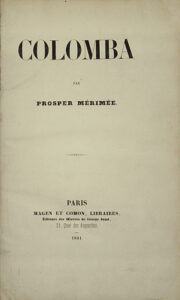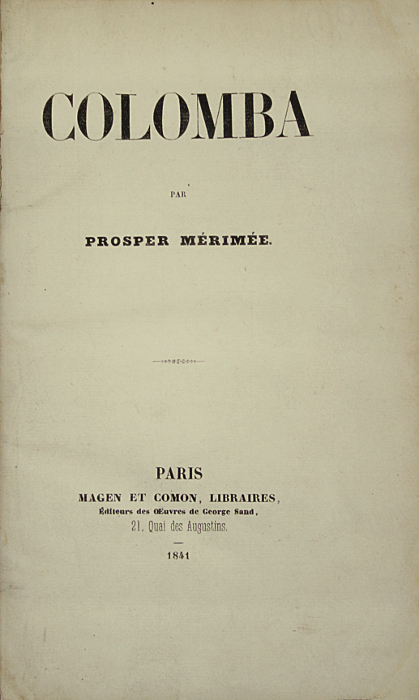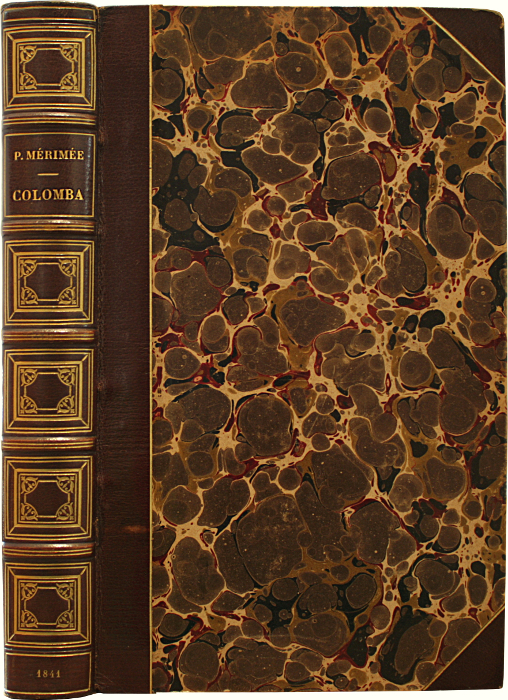MERIMEE, Prosper. Colomba. Paris, Magen et Comon, 1841.
8vo [224 x 134 mm] of (2) ll. (half-title and title), 463 pp. Bound in brown straight-grained quarter-morocco from the end of the 19th century, spine ribbed and finely decorated, gilt date at the foot of the spine, untrimmed.
« Very rare first edition of one of the most famous works by Prosper Merimee ». (Carteret, II, 144-146). Vicaire, V, 719-720; Rahir, p. 536; Clouzot, p. 201; Bulletin de la librairie Morgand et Fatout, 10511; Bibliothèque de feu M. Hector de Backer, 1530; Catalogue d’une bibliothèque représentant le mouvement romantique 1788-1850, 1468.
« Three Belgium pre-publication piracies were published previously at Hauman, Méline and Jamar, 1840. » Clouzot, Guide du bibliophile français, p. 201.
In addition to Colomba, the volume contains two short novels: La Vénus d’Ille and Les Ames du purgatoire.
After a stay in Corsica in 1839 as general inspector of the Historic buildings, Merimee wrote this short novel which dêls with vendetta and will be published in July 1840 in the Revue des Deux Mondes. The character of Colomba saw her father being murdered by his enemy who managed to escape from justice. Therefore she expects her brother, who is back on the island after a long absence, to avenge their father.
« The perfect construction of this short novel makes it almost a tragedy; the atmosphere is well painted with the old customs, the rough face of populations and the ones of the crooks; Colomba, avenging virgin, rises proud and pure. The style is bald, clêr, of high literary standard. The author rises well above his novel, but the care dedicated to his art proves that he is not entirely detached from it. Only one imperfection can be picked out in this masterpiece; Miss Nevil and her father are very conventional characters. » Dictionnaire des Oeuvres, I, 828.
« Parisian, born in a middle-class and Voltairian family, Prosper Merimee crossed Romanticism using a mask of phlegm, refusing to be moved or to be enthusiastic by taking the motto: “Remember to mistrust”. […] Well before becoming general inspector of the Historic buildings (1834), he had shown his taste for history in the Chronique du règne de Charles IX in which the importance of accurate details authenticates the account. His literary work has never been the essential concern of a life filled with his official functions (he becomes senator of the Second Empire in 1853, after he played a decisive part in the crêtion of a sensitivity watching over the rescue of the monuments from the past). […] His talents did wonders for the short novel: brief accounts, reduced to a crisis, to a strange fact, everything is in the art of the narrator who gains the attention of the rêder. Mosaïque gathered in 1833 about ten short novels published since 1839 in reviews (including Mateo Falcone, la Partie de tric-trac, Tamango); La Vénus d’Ille and Colomba in 1837 and 1840 confirmed the success of Mosaïque. » En Français dans le texte, 265.
A good untrimmed copy of this sought-after first edition of one of the most famous works by Prosper Merimee.



